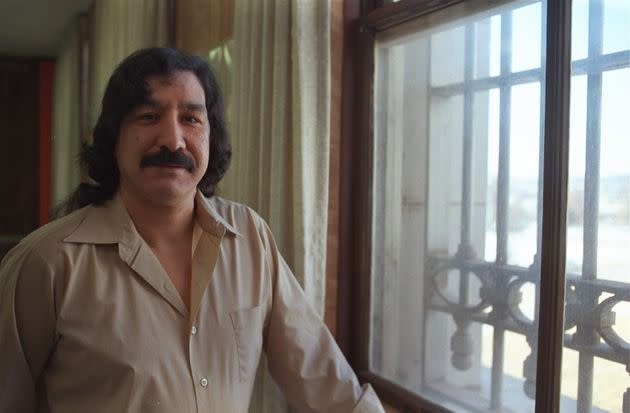U.N. Human Rights Legal Experts Call For Immediate Release Of Leonard Peltier
The prolonged imprisonment of Native American rights activist Leonard Peltier is “arbitrary,” and the U.S. government should release him immediately, concludes a damning legal opinion released by the United Nations Human Rights Council’s Working Group on Arbitrary Detention.
“Taking into account all the circumstances of the case, including the risk to Mr. Peltier’s health, the appropriate remedy would be to release Mr. Peltier immediately and accord him an enforceable right to compensation and other reparations, in accordance with international law,” says the group of legal experts behind the 17-page opinion.
Peltier, 77, has been in prison for 46 years without any evidence that he committed a crime and after a trial that was riddled with misconduct.
The U.N. Human Rights Council working group didn’t even go into the glaring problems with Peltier’s conviction; it notes that it “refrains from examining matters that are for the national authorities to determine,” like whether there was sufficient evidence to put Peltier in prison or whether his conduct has been exemplary in prison. Instead, the working group focused on whether Peltier’s parole process has met international standards. It has not.
Peltier has been deprived of his liberty “in contravention of articles 2, 7 and 9 of the Universal Declaration of Human Rights and articles 2 (1), 9 and 26 of the International Covenant on Civil and Political Rights,” says the legal opinion.
The working group is saying that between Peltier’s poor health and advanced age, his frequent placement in solitary confinement, and the difference between his time in prison compared to non-Native Americans convicted of similar offenses, there is clear evidence that his continued detention is unjust. The opinion also cites discriminatory comments made by his parole examiners in concluding, “Mr. Peltier continues to be detained because he is Native American.”
The U.S. government has six months to provide information to the working group demonstrating the actions it has taken in response to the injustices outlined in the opinion.
“We are pleased that the Working Group was willing to review Leonard’s case a second time after these past 17 years of unjust parole proceedings and arbitrary imprisonment,” said Kevin Sharp, Peltier’s pro bono attorney and a former U.S. District Court judge appointed by President Barack Obama. “The Working Group did not parse their words. They issued an immediate call to action, and the U.S. government must take Leonard’s clemency case seriously and release him back to the care of his tribe.”
Here’s a copy of the full legal opinion, which was issued on June 7 but wasn’t publicly circulated until this month:
The reason that Peltier is in prison at all is because the FBI and U.S. attorney’s office needed a fall guy after it failed to figure out who killed two FBI agents in a 1975 shootout on Pine Ridge Reservation in South Dakota.
Peltier’s co-defendants were acquitted based on self-defense. He was the last one available, so the U.S. government arrested him and put him through a trial that would not hold up in a U.S. court today. Prosecutors hid key evidence. The FBI threatened and coerced witnesses into lying. A juror admitted she was biased against Native Americans on the second day of the trial, but she was allowed to stay on anyway.
Based entirely on testimony from people who had been intimidated by the FBI, and operating within a 1970s-era criminal justice system tilted against Indigenous rights activists like Peltier, the U.S. attorney’s office successfully charged him with murder.
The FBI remains the biggest obstacle to Peltier going home, even as its argument for keeping him in prison is full of holes and misinformation. By all appearances, the bureau simply wants him to die in prison.

Leonard Peltier's prolonged imprisonment is “arbitrary,” and the U.S. government should release him immediately, says the U.N. Human Rights Council’s Working Group on Arbitrary Detention. (Photo: Associated Press)
But Peltier is still alive and in a Florida penitentiary. He is perhaps America’s longest-serving political prisoner, a holdover from a different era of justice orchestrated by J. Edgar Hoover. He survived a rough bout with COVID-19 last year, and today he’s managing several serious health problems, including diabetes and an abdominal aortic aneurysm. He has maintained his innocence all these years, even when it likely prevented him from being paroled.
Peltier’s story still moves hundreds of thousands of people to sign petitions in support of his release. An astounding mix of human rights leaders have urged his release over the years, including Pope Francis, the Dalai Lama, Mother Teresa, Nelson Mandela and Coretta Scott King. Prominent artists, including Willie Nelson, Bonnie Raitt, Jackson Browne and Rage Against the Machine, have held concerts in his name. Elected tribal leaders and the National Congress of American Indians have passed resolutions urging clemency.
His supporters have been urging President Joe Biden to grant clemency to Peltier and let him spend his final years at home with his family in South Dakota. In the past year, at least four U.S. senators ― Patrick Leahy (D-Vt.), Brian Schatz (D-Hawaii), Mazie Hirono (D-Hawaii) and Bernie Sanders (I-Vt.) ― have separately urged Biden to release him, too.
Late last week, Catholic News Service unexpectedly put a spotlight on renewed calls for clemency for Peltier ― just ahead of Pope Francis’ historic visit to Canada this week to apologize to Indigenous peoples for past abuses carried out by the church.
The White House has been mum on whether Biden thinks it’s time for Peltier to go home.
On Monday, a White House spokesperson did not respond to a request for comment on what the president thinks of Peltier’s continued imprisonment and if he is considering granting him clemency.
This article originally appeared on HuffPost and has been updated.